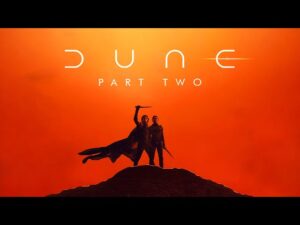
Dune: Part Two
Paul Atreides and his mother Jessica are among the Fremen together with the leader of one of their clans, Stilgar, and the warrior Chani. However, they will have to learn to be accepted by the entire Fremen people and above all Paul, who Stilgar believes to be the awaited Messiah of Dune promised by the Bene Gesserit, will have to make his prophecy come true, to gain an immense and deadly army and with it have the possibility of avenge his father, Duke Leto. But the prophecy that Paul sees is not just a dream of victory but a massacre of unprecedented proportions, a holy war that will set the entire galaxy on fire. Meanwhile, Baron Harkonnen continues to plot to take control of the empire and, faced with Rabban’s failures against the Fremen, decides to rely on another more lethal scion: Feyd-Rautha, who the Bene Gesserit believe can give birth to the their waiting supreme child.
Denis Villeneuve’s science fiction saga returns even more sumptuous and impressive, based on the novels by Frank Herbert. This time the cinema spectacle is freed from the weight of the writer’s pages, in a staging of rare power.
If in the first chapter the Canadian director had been rather faithful to Herbert’s text, despite cutting large parts – the same ones that David Lynch had already had to cut – in Dune – Part Two he instead makes more drastic, but decidedly happy choices. For example, one of the most useless subplots of the book falls away, the one in which Gurney Halleck, whom Paul will meet again as a smuggler, wants to take revenge on Jessica because she considers her the traitor of the Duke.
Even more clear is the transformation of the character of Alia Atreides, Paul’s sister who receives visions of the Fremen waters of life while she is still in her mother’s womb. The Bene Gesserit will consider her an abomination, but the little girl who in the book arrived at the emperor’s court where no one wants her but where inexplicably no one even removes her, simply still has no way of being born here. The time of the film is in fact limited, Paul does not stay with the Fremen for years, he does not have a first child with Chani (destined in the book to die at the hands of the imperial troops) and therefore it cannot be Alia, fortunately, who poisons the Baron Harkonnen in what was the most anticlimactic scene of Herbert’s tome.
Villeneuve finds other, more cinematic, paths and gives much more space to the conflict, which Herbert instead dismissed in broad ellipses, interested in court intrigues rather than war maneuvers. Yet it is only in showing the war that it is truly possible to give substance right now to the dark side of the prophecy that haunts Paul, that is, that endless war that will make him the worst murderer in the history of humanity. In fact, Herbert promises a superhuman Messiah but does not make him a savior, on the contrary his rise is an unprecedented catastrophe, which although it lays the foundations for a sort of renaissance, however, passes through a Holy War the likes of which have never been seen.
Fate is merciless and, as much as Paul wants to choose love with Chani and ward off his nightmares, he will have no way to do so: drinking the waters of life will take away his self-control, alter his own personality and lead him to lead by Alia, who here as we were saying is still just a fetus but is already a telepathic entity capable of seeing the future.







